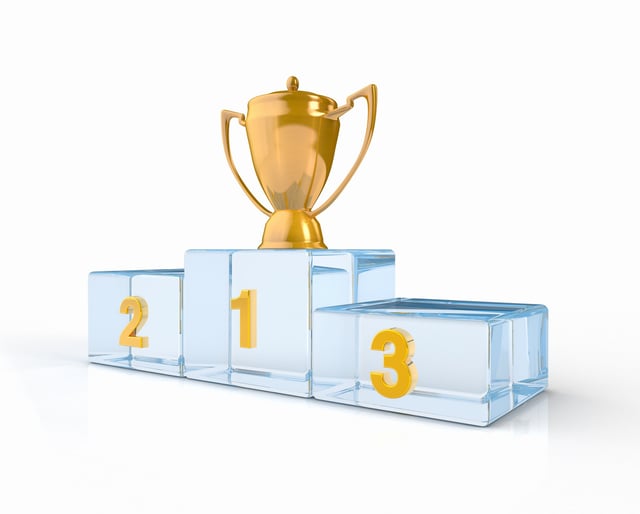What I Learned from Watching the Olympics and How it Applies to Selling
Maybe I can’t run as fast as Usain Bolt or swim faster than Michael Phelps, but I can be a better salesperson than I am.
Here are four things I learned from watching the Olympics that you can apply to selling and will make you a better salesperson:

#1. Miracles can happen at the finish line.
There were countless times, across many sports, when the team or individual predicted to win came in 2nd (or worse), beaten by someone the experts said was not ready to win. In many events, the predicted winner was ahead – until the last few inches.
I visualize my competitors as the athletes who came up short. If someone is only going to push for the first 95% of a race and lose at the end, then let it be the other guy. Salespeople must train for those final 5 meters of each sale.
Why? Because how many times have you stopped working on a sale just before it closed – either because of over-confidence or fear of failure?
The Sales Lesson:
Don’t assume you have the deal sown up until you have the signed contract in your hand.
If there is a delay in getting the signed contract, we must anticipate this feeling of frustration and adjust our strategy accordingly. Did you misread their buying signals? Maybe they weren’t as ready to buy as you thought?
The solution is to get creative and change the conversation. Don’t keep sending “checking-in about the contract” emails, but rather, keep pushing the sale forward by verifying you have the right information and gently start communicating urgency around any type of collaboration that’s needed to start planning for implementation of the product or service.
#2. When things go wrong, we must adjust.
Cyclists had collisions, swimmers tore their bathing caps, and relay runners dropped their batons – all before finally winning their events.
As a salesperson, we can learn a lot from how Olympic athletes are trained to handle these types of unfavorable situations. If you don’t train and practice for every different situation, then all you’re doing is hoping you don’t fall apart under pressure.
Instead of freezing up or panicking when something goes wrong, like if you experience a technical problem during an important meeting or if there’s a last minute location change that completely throws you off, you must train yourself to adjust and re-strategize.
Training helps us continually adapt and optimize our approach to every element of the sales process. You can begin by recognizing your own patterns, like having a knee-jerk response to ever-changing sales objections. Don’t get thrown off. Instead, invent new strategies, habits, and best practices to change your results. You may not be able to prevent the myriad of sales problems from occurring, but you can train yourself to stay calm and confident under pressure like Simone Biles from the US Women’s Gymnastics team.
The Sales Lesson:
There is more than one right way to do everything. The opportunity cost of selling in one way is not learning how much better another way might work. By increasing the range of questions you ask, answers you give and next-step strategies you recommend you become better and better at being ready for anything—even if you feel like you’re not.
#3. Even individual events go better with a team approach.
I love watching the relays – it is the best illustration of how individuals, even Michael Phelps, can actually go faster when competing for the team not just themselves. Even when the athlete had no official teammate, they often credited the tips they learned and the extra motivation they got from other athletes. Somehow, when other racers won gold, they inspired their teammates to follow suit. While the best athletes pull great performances out of themselves, they seem to do it better when they allow themselves to be open to other athletes.
The Sales Lesson:
We salespeople are part of a huge community of professionals who may not be directly competing against us but are doing the same things we all do: prospect, qualify, present, and close. We can - and should - learn from each other. Here’s a few ways how:
- Join sales discussion groups and professional organizations
- Read sales books and other books related to sales (Emotional Intelligence, Game Theory, etc.)
- Take a course in public speaking and improvisation.
Stepping out of what’s familiar and trying something different can help us develop a new sales technique or strategy. Personal motivation helps, but it only goes so far. Keep recharging your own efforts by seeking out other salespeople whose examples inspire you.
#4. Learn and build upon both success and failure.
A lot of the athletes who won in Rio this year said they were motivated from losing in the 2012 London Olympics. Now, athletes who lost at Rio are committed to getting to Tokyo for the 2020 Olympics.
Similarly, sales is like an emotional roller coaster ride – one moment it is the best job in the world and the next it is the worst. We are ready to quit in the morning when a customer announces they are moving in another direction, and then high-fiving in the afternoon when we hear about a deal moving forward.
The Sales Lesson:
As salespeople, we should be as committed to our sales goals as Olympic athletes are to their goals. There is no quitting, there is only continuing, no matter what. Don’t let momentary ups and downs distract us from the daily processes that set us up for long-term success. Every day, focus on the things that a year from now you will wish you did today. Because we sell for a living, not just to make money.
About Steve Bookbinder
Steve Bookbinder is the CEO and sales expert at DMTraining. He has delivered more than 5,000 workshops and speeches to clients all over the world and has trained, coached, and managed more than 50,000 salespeople and managers. Steve continuously refreshes his training content to reflect his latest first-hand observations of salespeople across industries and regions. Through him, participants in his workshops and coaching sessions learn the best practices of today’s most successful sellers and managers across industries. Steve understands that sales is a competitive game. To outperform competitors and our own personal best results, we need to out-prospect, out-qualify, out-present and out-negotiate everyone else, not merely know how to sell. Through his specialty programs in Pipeline Management, Personal Marketing, Great First Meetings, 2nd-level Questioning, Sales Negotiating, and Sales Coaching, Steve trains sales teams to master the skills they need to overcome the challenges they face in today’s world… and keep improving results year over year.





